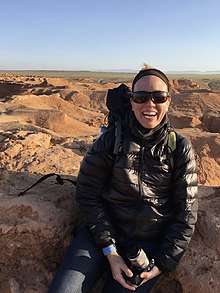Lydia V. Pyne
Lydia V. Pyne is an American historian and science writer. She is a current visiting fellow at the Institute for Historical Studies at the University of Texas at Austin.[4] Pyne and her work have been featured in National Geographic,[2] Inside Higher Education,[5] the Wall Street Journal,[6] and on ABC,[7] Science Friday,[8] WHYY,[9] KERA,[10] Wisconsin Public Radio,[11] and Talk Nerdy.[12]
Lydia V. Pyne | |
|---|---|
 Lydie Pyne at the Flaming Cliffs in 2017. | |
| Born | United States |
| Occupation | Writer Historian[1] |
| Language | English |
| Residence | Austin, Texas, United States[2] |
| Nationality | American |
| Citizenship | United States |
| Education | University of Texas[1] |
| Alma mater | Arizona State University[3] |
| Genre | History Non-fiction |
| Subject | Science |
| Website | |
| www | |
Early life and education
Pyne credits her father, Stephen J. Pyne and her mother, Sonja,[13] with encouraging her to pursue the sciences by being "curious about a lot of things". When she pursued higher education, Pyne was an English major.[1] She ended up switching to anthropology and history, earning a double-major in the subjects, both from Arizona State University.[1][14] She earned her master's from the University of Texas, Austin in anthropology and biology at Arizona State.[1][14] For her PhD, she started as an archaeology student and in the end, earned a degree in history and philosophy of science from Arizona State University.[1][3]
Career
Pyne's first book was The Last Lost World: Ice Ages, Human Origins, and the Invention of the Pleistocene was co-authored with her father, Stephen J. Pyne in 2012.[1] That year, she served as a fellow at Pennoni Honors College at Drexel University.[12]
Pyne's second book is Bookshelf, a history of the bookshelf, which was published in 2016 by Bloomsbury as part of their "Object Lessons" series.[1] That same year, Viking Press published Pyne's Seven Skeletons: The Evolution of the World's Most Famous Human Fossils. Seven Skeletons presents the history of "celebrity fossils" including Lucy and La Chapelle-aux-Saints 1.[2]
In 2019, Pyne's book Genuine Fakes: How Phony Things Teach Us About Real Stuff was published by Bloomsbury. The book examines the difference between artificial and "real" things, such as real diamonds versus lab grown diamonds.[8]
Currently, Pyne is a visiting researcher at the Institute for Historical Studies at the University of Texas at Austin.[4] Pyne is also a freelance writer. Her science and history writing has been published in Hyperallergic,[15] the Pacific Standard[16] and Archaeology.[17]
Works
- with Stephen J. Pyne: The Last Lost World: Ice Ages, Human Origins, and the Invention of the Pleistocene. Viking. 2012.[18] pbk edition. 2013. ISBN 978-0-14-312342-2.
- Bookshelf. Object Lessons (a book series about the hidden lives of ordinary things). Bloomsbury. 2016.[19] pbk edition. 2016. ISBN 978-1-5013-0732-4.
- Seven Skeletons: The Evolution of the World's Most Famous Human Fossils. Viking. 2016.[20]
- Genuine Fakes: How Phony Things Teach Us About Real Stuff. Bloomsbury. ISBN 978-1-4729-6182-2.[21]
Personal life
Pyne lives in Austin, Texas.[2] She's an active member of the American Alpine Club.[22]
References
- Brenner, Wayne Alan. "The Seven Skeletons of Lydia Pyne". Austin Chronicle. Retrieved 8 March 2020.
- Worrall, Simon (25 September 2016). "Meet 7 Celebrity Fossils and Find Out What Made Them Famous". National Geographic News. Retrieved 8 March 2020.
- "Father-daughter co-authors explore new approach to human origins". ASU Now: Access, Excellence, Impact. 26 October 2012. Retrieved 10 March 2020.
- "Genuine Fakes: How Phony Things Teach Us about Real Stuff". Bookshop. 29 October 2019. Retrieved 10 March 2020.
- McLemee, Scott. "Lydia Pyne, 'Genuine Fakes: How Phony Things Teach Us About Real Stuff' | Inside Higher Ed". Inside Higher Education. Retrieved 8 March 2020.
- Poole, Steven (10 December 2019). "'Genuine Fakes' Review: Not Quite the Real Thing". Wall Street Journal. Retrieved 8 March 2020.
- "Bookshelf - A History". Radio National. 6 September 2016. Retrieved 8 March 2020.
- "In A World Of Lab-Grown Diamonds, What Is Real And Fake?". Science Friday. Retrieved 8 March 2020.
- "Fake vs. Real — And When It Matters". WHYY. Retrieved 8 March 2020.
- "Famous Fossils". Think. 17 August 2016. Retrieved 8 March 2020.
- Peterson, Tim (5 December 2019). "Fake Or Not? And Does It Matter?". Wisconsin Public Radio. Retrieved 8 March 2020.
- "Talk Nerdy Episode 283 - Lydia Pyne". Talk Nerdy. Retrieved 8 March 2020.
- "Stephen J. Pyne". Stephen Pyne's website. Retrieved 10 March 2020.
- "CV". Lydia Pyne. Retrieved 10 March 2020.
- "Belated Acclaim for Dorothy Hood's Surreal Abstractions". Hyperallergic. 15 November 2019. Retrieved 8 March 2020.
- Pyne, Lydia. "'Dinosaur Diplomacy': Andrew Carnegie Thought Fossils Could Save Europe From World War I". Pacific Standard. Retrieved 8 March 2020.
- Pyne, Lydia. "Denisovans at Altitude - Archaeology Magazine". Archaeology. Retrieved 8 March 2020.
- "Review of The Last Lost World: Ice Ages, Human Origins, and the Invention of the Pleistocene by Lydia V. Pyne and Stephen J. Pyne". Publishers Weekly. 26 March 2012.
- "The Meaning of a Bookshelf: An Interview with Lydia Pyne". BookPeople. 29 January 2016.
- "Review of Seven Skeletons: The Evolution of the World's Most Famous Human Fossils by Lydia Pyne". Kirkus Reviews. 2016.
- "Review of Genuine Fakes: How Phony Things Teach Us About Real Stuff by Lydia Pyne". Publishers Weekly. 14 June 2019.
- "AAC Publications - Alam Kuh (4,805m) and Damavand (5,610m), AAC Exchange". American Alpine Club. Retrieved 10 March 2020.
External links
- Official website
- Appearances on C-SPAN
- Lydia Pyne's Talks at Google presentation about Genuine Fakes: How Phony Things Teach Us About Real Stuff